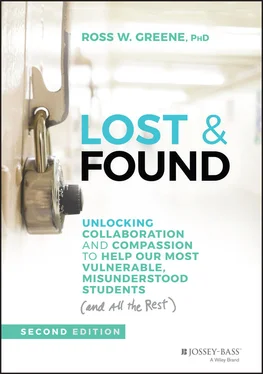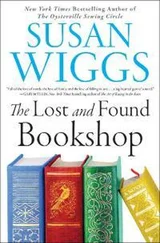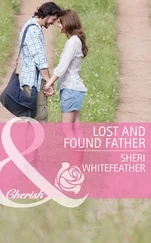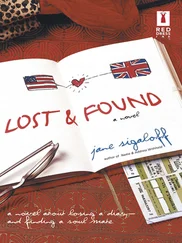—NINA, PRINCIPAL
Question:But we've always used incentive programs in my building. Should we stop?
Answer:Most schools have been using incentive programs for a very long time. But when I ask school staff why they're still using incentive‐based programs, the most common response they give—while simultaneously telling me that those programs aren't working for many of the kids they're trying to help—is “because it's the way we've always done it.” Of course, if the way we've always done it isn't working for the kids we've always done it to, we probably ought to stop doing it and think of something better to do.
Question:Does this mean that consequences should no longer be applied to concerning behavior?
Answer:That's right. But let's distinguish between the two types of consequences— natural and adult‐imposed —and consider whether either would solve the problems that are causing the concerning behaviors to which we're applying those consequences. Natural consequences—being liked or disliked, being included or excluded, feeling happy or ashamed by one's behavior, doing well or poorly on an exam—are very powerful and persuasive. They're also inevitable. Adult‐imposed, “logical,” “unnatural,” or “artificial” consequences are often added when the natural consequences don't have the desired effect. These include punishments, such as being deprived of recess, being held after school, detention, suspension, and paddling; and rewards, such as stickers, happy faces, points, and special privileges. Adult‐imposed consequences are also very powerful and persuasive. But if those very powerful, persuasive natural consequences didn’t get the job done, it’s hard to imagine why adding adult imposed consequences would accomplish the mission. And although natural and adult‐imposed consequences might be effective at modifying a student's behaviors, they don't solve the problems that are causing those behaviors. The students who are on the receiving end of endless natural and adult‐imposed consequences clearly need something else from us.
“You can't fault teachers for wanting to give kids more and more consequences. As a school leader, you have to listen to why teachers feel they need those consequences. With one teacher, she was feeling that her class was spinning out of control. And she was sort of feeling like, ‘If I don't get this child under control now, I'll lose control of the whole group, and I won't get anything taught this year.’”
—NINA, PRINCIPAL
Question:Does the alternative definition of function mean that we should stop doing FBAs?
Answer:No, FBAs are a wonderful thing, but only when we stop coming to the automatic belief that a student's concerning behavior is working and that the behavior is effective at helping the student get , escape , and avoid . FBAs are a lot more meaningful when they are informed by lagging skills and unsolved problems. I've had way too many classroom teachers tell me that there's really no point in reading a student's FBA because all FBAs say the exact same thing. If all FBAs say the exact same thing, then those are perfunctory, boilerplate FBAs, not useful, informative, meaningful FBAs. You'll find a meaningful FBA—one filled with information about lagging skills and unsolved problems—in figure 3.1.
Question:We can't just do nothing in response to concerning behavior! Consequences at least help us feel like we're doing something . What should we do instead?
Answer:Not relying on adult‐imposed consequences doesn't mean you're doing nothing. It means you've come to recognize the limitations of that form of intervention. There's no reason to continue doing something if that something isn't getting the job done. As for what you'll be doing instead, that's what the rest of the book is about.
AMBERVILLE SCHOOL DISTRICT
FUNCTIONAL BEHAVIOR ASSESSMENT REPORT
Name:TJ
Date of Birth:04/29/2004
Parents:
Grade:10
School:High School
Examiner:
Date of Report:06/10/19
REASON FOR REFERRAL:
TJ was referred for a functional behavior assessment (FBA) by school staff due to concerns regarding a number of problems that appear to be impeding his learning, his integration into the classroom community, and the development of prosocial relationships. This FBA was conducted to 1) identify lagging skills and unsolved problems that are interfering with TJ's functioning in the school setting so that staff can understand his difficulties and so that these problems can be solved collaboratively; 2) identify and recommend possible environmental structures and supports (e.g., time, space, materials, interactions); and 3) identify and recommend appropriate strategies and supports needed to assist in implementing agreed upon solutions.
PROCEDURES USED:
Classroom Observations
Assessment of Lagging Skills and Unsolved Problems (ALSUP)
Review of records
Teacher Interview
Parent Interview
Student Plan B Conversation/Interview
RESULTS/FINDINGS:
Direct Observations:
Two time-on-task observations were conducted: the first, during Biology, revealed that TJ was on task 38% of the time in comparison to a same-age, same-sex peer who was on task 94% of the time. When TJ was on task, he was completing a lab writing assignment and copying homework assigned into his planner. When he was off-task, he was expected to listen to an article that was being read aloud and to write a short summary of the article. Overt behaviors exhibited during off-task times included walking around the classroom, talking with peers, and poking a peer with a pencil. His teacher, Ms. D., said that TJ is better able to meet expectations when he is paired with the two girls who are now his lab partners, but she is unable to pair him with these girls on all assignments. Ms. D. reported that she has to “keep a very close eye” on TJ and that this can make it hard for her to teach, and it gets “exhausting.” In the second observation, TJ first walked from PE class to the lunch room. On the way he tried to interact with two other male peers but they rolled their eyes, turned their backs on him, and appeared disinterested in interacting with him. When TJ persisted, one of the boys held out his hand as if to stop TJ and said, “Dude, don't you get that we don't want you?” TJ appeared dejected and turned away suddenly. He banged into another student and growled “get out of my way.” The other student backed off, and TJ went and sat alone at a table in the yard. He ate only a bit of his lunch and threw out the rest. He then went and sat with a group of girls at a table on the other side of the yard. He seemed calmer and happier with this group of girls, but noticeably darkened when the two boys he interacted with earlier passed in the hall adjacent to the yard. He then stood up and walked around a bit without any clear destination. The rest of lunch was uneventful; TJ played with a rubber ball he carried in his pocket, throwing it repeatedly against a wall by himself until the bell rang. According to the Vice Principal, Ms. Y., TJ gets into trouble at least 2–3 times per week with the peers with whom he interacted at the beginning of lunch, and sometimes it leads to him being restricted from the yard. She frequently requires that TJ stay with her at lunch time as a result.
Maladaptive Behaviors Impeding Positive School Functioning:
Читать дальше












